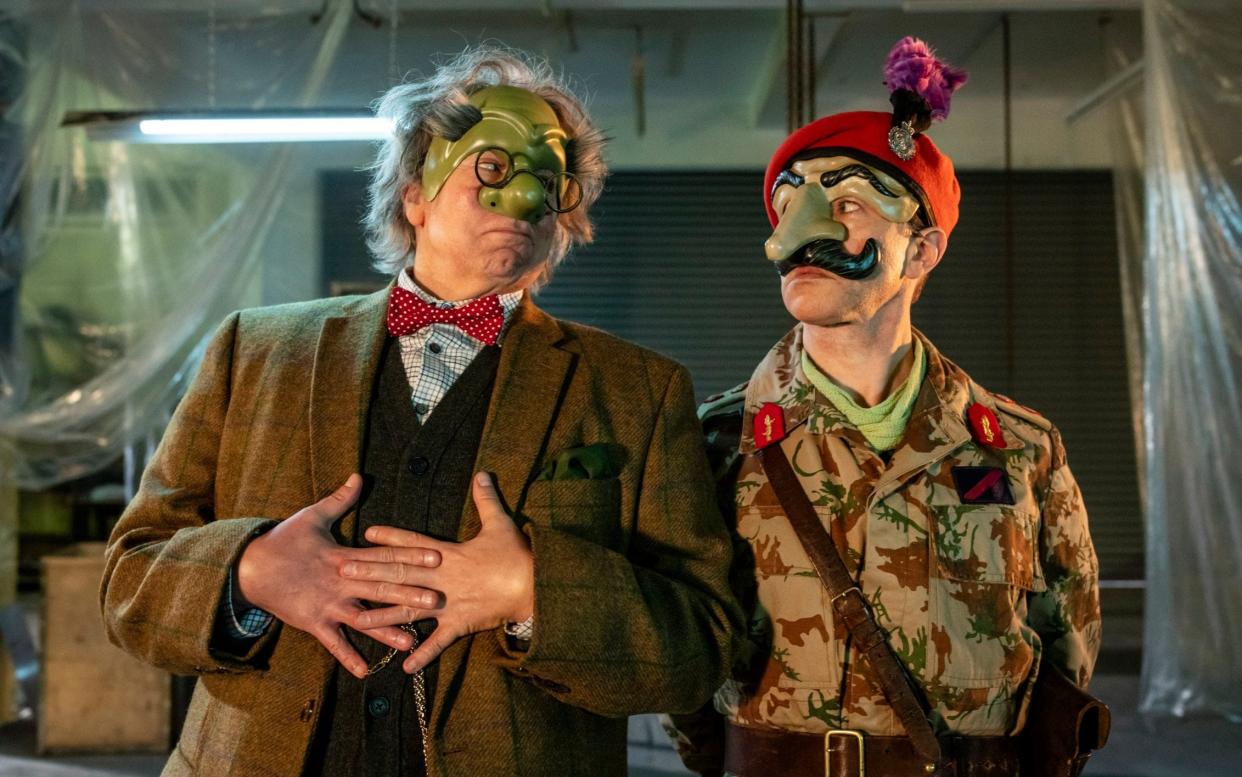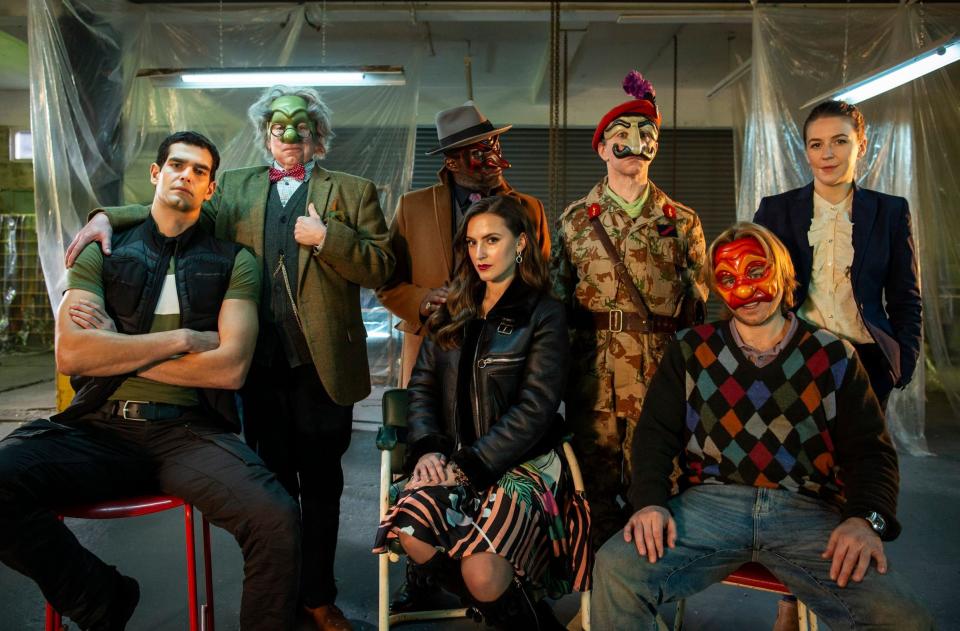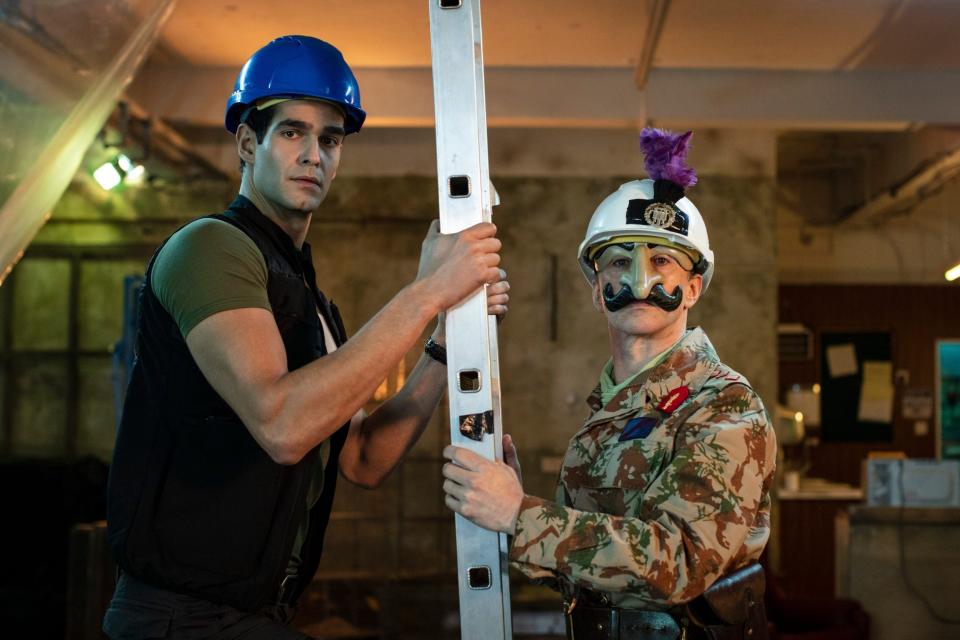Forget Romeo & Juliet - if you want televised theatre, watch Inside No 9

The coronavirus crisis has devastated theatre while television has thrived. Auditoriums have sat empty in a year when streamers like Disney+ have signed up 100 million plus subscribers. Many wonder whether theatre will ever recover.
The irony, then, is that this year’s most original piece of television is a hymn to theatre. The first episode of the sixth series of Inside No 9, Steve Pemberton and Reece Shearsmith’s anthology series, is a bravura piece of storytelling based on a commedia dell’arte structure hybridised with a heist flick. Called Wuthering Heist (the first of a torrent of puns) – it follows Inside No 9’s single abiding rule – that every episode must take place inside somewhere labelled "9".
In this case the 9 is a warehouse from within which we learn of a jewel robbery gone wrong. But the story is told in a genre-bending style that is by turns hugely meta, surprisingly violent and very silly. It references everything from Line of Duty to Fleabag, while masked characters break the fourth wall, fall over, pun relentlessly and double-cross one another. It’s like Reservoir Dogs meets Benny Hill.
“It's a massive mash up that shouldn't work,” says Gemma Whelan, who plays Columbina (the perky maid commedia archetype). “But it really does.”
Wuthering Heist not only works – it works on several levels. Those well versed in commedia tropes and rules will enjoy watching them be both observed and subverted. Those who couldn’t give a fig for 16th-century dramaturgy will just find the whole thing a blast, because the language of comedy is universal. As Shearsmith points out, even the masks, those most obvious symbols of suspension of disbelief, do double time.
“In the end, people will watch this episode, and think, ‘They're wearing masks because they're doing a robbery.’ You won't really even think about the fact that all the characters are sort of archetypal tropes and characters from commedia.”

Inside No 9 is an anthology show with every half-hour episode telling a new story bound only by that single, titular rule. They have done theatre stories before, most notably in series one’s superb The Understudy. But though that episode was about theatre, it wasn’t theatrical in its conception and execution. Wuthering Heist is a feast of stagecraft in everything from its structure to its production.
“We had a week’s rehearsal, which you never get in television,” says Kevin Bishop, the actor and comic who plays Arlecchino, the classic servant to two masters. “And there were two directors, a theatrical director and a televisual director.” The theatre director in this instance was none other than Cal McCrystal, who directed the smash-hit commedia farce One Man, Two Guvnors starring James Corden. He helped the cast with the mask work and the physicality of their performances.
“I felt like this is how I should be doing everything,” says Bishop, “because I'm very physical with my comedy. And I always have been and I think it's because I come from a theatrical background, you know? When I was very young, I used to do mostly theatre. And most of my work is live or theatrical as I've gotten older as well.”
Bishop, Whelan and Paterson Joseph’s casting was done to suit the material. The actors were chosen precisely because of a background in theatre and an understanding of stage performance.
“It was really important to get actors with a huge range,” says series producer Adam Tandy. “ They couldn’t do just cinematic or doing the broad commedia dell’arte acting – they have to be able to do both and judge that balance in the same way that Reece and Steve have in the writing.”

“I’ve done loads of theatre so doing this actually felt very freeing,” says Joseph, who plays Pantalone, the gang leader. “A lot of us in the acting world love what Reece and Steve do. Their work is always pushing boundaries with people that they get. And the things that they do are always slightly left field. You get to do things you don’t normally get asked to do and that’s what all actors want.”
The episode not only looks theatrical but the cast say filming it was like making theatre too. “We did quite a lot of long shots,” says Whelan, “that would connect us all up within its frame as we were revealed by the cameras. It meant we had to really work out the choreography of it – who was going to be where, how we would work that out and so on.”
They spent most of their rehearsal week mapping out movement and honing timing – who enters and exits where and when and where do they need to stand with what props at any given moment. Essentially what they were doing was rehearsing a play.
All of this runs counter to the prevailing mood in television. The streamers want returning, ideally global series occupying vast imagined worlds. They have the money to create those worlds, be it in lavish sets or spectacular CGI. There are no limits to what can be imagined or created.
Theatre, by contrast, is bound by strict rules including that there is a stage, an audience and only so much time you can expect that audience to sit in one place watching. Add the conventions of commedia dell’arte and Inside No 9's own precepts and Wuthering Heist should be shackled from its inception. Yet instead, those very rules and limitations have given rise to inventiveness and brio.
“Obviously we could have done a lot of CGI in this episode but it was so fun working out the logistics,” says Whelan. “We did this slow-motion scene that we actually filmed in real time, but did everything very slowly. We had to throw things at the right time, jump up at the right time… it was a team effort to make something that could have easily been done by CGI, but it looks fantastic. We had a week to do the episode, all of us there all of the time. And it's really innovative and artistic and clever and inventive and it was really fun to work that way.”
When Inside No 9 began in 2014, anthology series were seen as dated, discarded in favour of mini-series and serial dramas. But with shows like Black Mirror and American Horror Story attracting huge movie stars with the promise of short, high-profile bursts of work, they have become fashionable again.
“Maybe it's a reaction to the long commitment that you have to have when you watch all the other shows on TV that are 20 episodes a season or whatever it might be,” says Shearsmith. “With us it’s like being told a funny joke, you're in and out, and you have a great ending. And hopefully, it's been satisfying – there's a lot of storytelling in each episode so it feels like you've been on a bigger journey than you have in 28 minutes. We were sort of out of favour at one time but there are a lot more anthology series of one-off stories, because it feels like it's on the rise again. And people have realised, of course, it doesn't matter what it is: as long as you're telling good stories, people will stick with it.”
Pemberton and Shearsmith have turned their previous series, including The League of Gentlemen, into live shows. So might this television programme that’s so influenced by theatre end up in theatres, whenever they return?
“We definitely want to, at some point, explore the live version of Inside No 9” says Pemberton, “because it's so perfectly suited – they are like mini plays when we write them and we were inspired by by our own theatre backgrounds. Each series that's gone on, we've thought, yeah, we can try throwing something completely new in to the mix here and see how people react. And there's nothing more exciting than that in my view.”
Inside No 9 airs on Monday 10 May at 9.30pm on BBC Two and BBC iPlayer and continues weekly
The companion podcast Inside Inside No 9 is available every Monday on BBC Sounds from 10 May, straight after each television episode airs
Solve the daily Crossword

